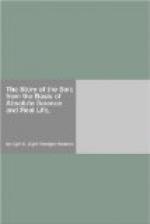“We don’t produce any,” said Mr. Robbins; “at least we know we wouldn’t produce any corn without fertilizing the land in one way or another. If you will walk over here a little ways you can see for yourself. I didn’t have quite enough manure to finish this field and I had no more time to haul seaweed so I planted without getting any manure on a few rods in one corner, and the corn there wouldn’t make three bushels from an acre. I didn’t bother to try to cut it, but the cows will get what little fodder there is as soon as I can get the shocks out of the field and turn ’em in for a few days to pick up what they can.”
Percy examined the corn plants still standing in the corner of the field. They had grown to a height of about two feet. Most of them had tassels and many of them appeared to have little ears, but really had only husks containing no ear. In a few places where the hill contained only one plant a little nubbin of corn could be found.
“I don’t mean to let any of my land get as poor as this field was,” continued Mr. Robbins, “but I just couldn’t get to it, and I left it in hay about two years longer than I should have done. Last year was first class for hay but this field had been down so long it was hardly worth cutting.”
“About what yield do you get from the manured land?” inquired Percy.
“In a fair year I get about forty bushels, and that’s about what I am getting this year from my best fields. You see there’s lots of corn in these shocks. There’s about an average ear, and we get five or six ears to the hill.”
“Eight-row flint,” said Percy, as he took the ear in his hand and drew a celluloid paper knife from his vest pocket with a six-inch scale marked on one side.
“Yes, Sir, our regular Rhode Island White Cap.”
“Just five inches long. Weight about three ounces?”
“Perhaps. We count on about four hundred ears to the bushel. If we get four thousand hills to the acre one ear to the hill would give us ten bushels per acre, so you see we only have to have four ears to the hill to make our forty bushels. A good many hills have five to six ears, but then of course, some hills don’t have much of any, so I suppose my corn makes an average of four ears about like that.”
“I suppose you feed all of the corn you raise in order to produce as much manure as possible.”
“Feed that corn! Not much we don’t. Why, corn like that brings us close on to a dollar a bushel. No, Sir, we don’t feed this corn. It’s all used for meal. It makes the best kind of corn meal. No, we buy corn for feed; western corn. Oh, we feed lots of corn; three times as much as we raise; but we don’t feed dollar corn, when we can buy western corn for seventy-five or eighty cents.
“I sell corn and I sell potatoes; that’s all except the milk. I keep most of my land in meadow and pasture and feed everything I raise except the corn and potatoes. And milk is a good product with us. We average about sixty cents a pound for butter fat, and it’s ready money every month; and, of course, we need it every month to pay for feed.”




